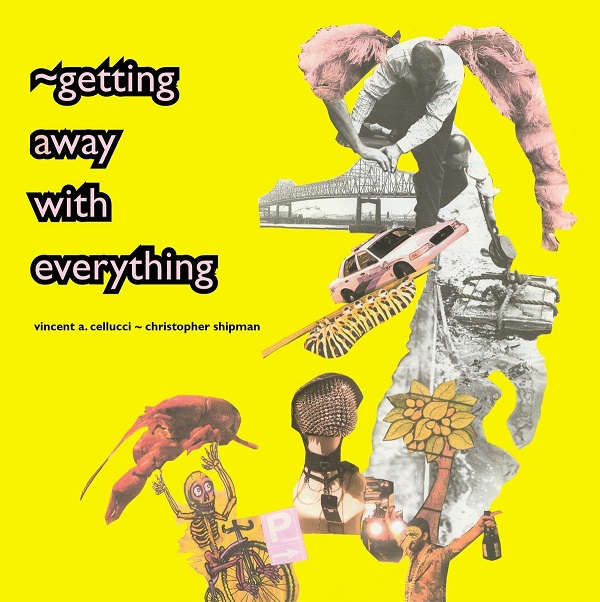
~getting away with everything
Vincent A. Cellucci and Christopher Shipman
Unlikely Books, New Orleans, 2021
Paperback, 250 pages
Beth Ann Fennelly’s back-cover blurb stating “The bad boys of poetry are back!” is a hilarious way to frame an extremely unique psychic spelunking, mostly because the innovative poetics involved in this new collection promote no violence or ill will. The only thing “bad” these reformed arsonists ever did was do what all bona fide poets eventually do: grow older and challenge the status quo further. Still, I like thinking of them as mischievous punks on a mission to fuck shit up.
Publisher Jonathan Penton prefaces with the information that “Badass poets Vincent A. Cellucci and Christopher Shipman” have engaged in “vandalism and regular bouts of debauchery,” but what this book is really about is making sense of departure. Having flown the carnival womb of New Orleans, Vince and Shippy have graduated to thirty-something family-man status, one in NC, the other in the Netherlands, and both expats for the same reason: continued disillusionment with an ever-orphaning social experiment that’s been made “great again.”
But here’s the clincher: The poems herein are anonymous, sent back and forth through cyberzap with no clear delineation betwixt who wrote what. So basically, it’s all one POV with occasional clues to original authorship, which doesn’t matter at all. I mean, does it really matter who wrote specific scandalous lines in the collaborative shock-sonnets of bad French boys Arthur Rimbaud and Paul Verlaine? Hell no! This is that very tradition re-envisioned for a twenty-first-century pandemic corndog in which “getting away with everything” means… well, that’s the question underneath the microscope.
En route to address this mystery, we hit all sorts of glittering veins radiating lines like: “it’s a turtle eat / turtle fuck / terrarium / out there;” “sometimes stars / are sharks lost / in any river crossed;” and
why do we always lie
about the sky
heavenly heavens to betsy
stealth bombers
drones, storks
9/11 santa claus
chemtrails, aliens
earhart, jesus
icarus, wright
Plus
once at 14 I went to the projects
to buy forty dollars of weed
with my friend billy
who could drive
that was my first 9mm to the head
Point being: These ain’t your regular MFA white-bread white guys ground out by the Meat Grinder; these are two highly metaphoric/colorful commentators on what we’re doing to the whole “foul cake cooked in hell” in which “the predator president / flaunts how he evades a cage.” The word “chthonic” even comes up because these two muckrakers have been to the underworld and back. And like Gilgamesh, they have emerged stronger and more versatile, even optimistic.
The poem “another city lights pilgrimage” is evidence of this transmogrification, hilariously detailing Beat-lineage in DNA steering voice to stalk centurion Ferlinghetti while musing from Vesuvio’s & reminiscing scenarios played out in the historic store—a true, wide-eyed testimony to connect with Lit Heroes soon gone. Likewise, the momentum in “mae’s-en-scène” is something to aspire to, weaving late-night booze-fueled flashes of “musicians / locals, cooks, dealers / hobos, college students / even the cops” with “a dealer and dear friend / selling me a car for $1 and a drink” unto “drifting uptown, downtown, st. charles, to the fly . . . . getting handled by an off duty pig / smashing my face in the concrete stairs” (see what I mean about chthonic?), all to recall “feeling / alive and fucked up / immune to / mistakes washed away in the mississippi.”
Thus, a “limited rebellion / crouching toward the desire to see / an even fuller spectrum” is chronicled as singular experience “risking insanity for sanity,” which isn’t too hard to decode. And in doing so, our chuckling protags
push past forces of the state
that have never represented
interest besides their golden own . . . to
become more than mere anarchy
Their chrysalises being: “a pusherman of language / and the experience to wield it.”
But what of the “getting away” motif in which “it’s much simpler / to get away with everything / when getting away / with mere nothing / is no cinch”? Forms of this thematic refrain keep popping up throughout, announcing stuff like “—to get away / one must get away with (nothing and) everything” and “A few friends are drunk, more than one / sporting a ragged pair of assless chaps—none / getting away with anything we wouldn’t.” To the point that readers wonder what the deal is to “getaway in gulps / our contents all catalyst.”
Answer = hell if anybody knows! But this is the most likely rationale:
. . . my eyes my ears
are strapped to you my friend
so rejoicing I am to be
to get away with everything
to share this sacred space is to hold
ourselves in the dark to press against
the noise the terrible
novelty of light to tell every story
to get away
with nothing
if not a line break
So ultimately, that’s what we get: two quixotic tongues joining as one, breaking lines like breaking bread—a new, millennial, bad-boy-buddy poetix infused with the spirit of Frank O’Hara’s “Personism” driving striving to connect. In a universe, I should add, where “The sky is never finished / so nothing is.”